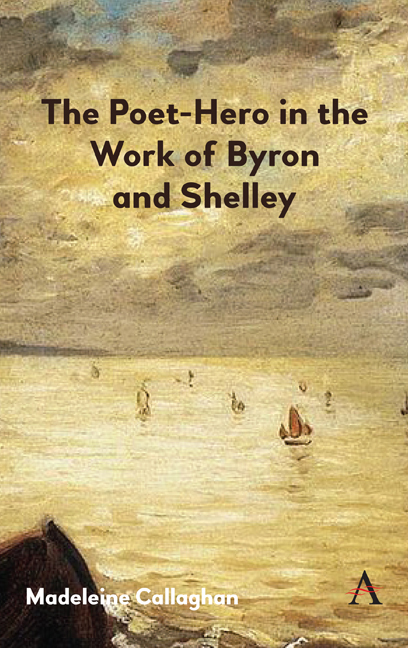Book contents
- Frontmatter
- Dedication
- Contents
- Acknowledgements
- Note on Texts and Abbreviations
- Introduction: The Poet-Hero: ‘Who shall trace the void?’
- Part I Byron
- Chapter One ‘A tyrant-spell’: The Byronic (Poet-)Hero in Manfred, Childe Harold's Pilgrimage and Beppo
- Chapter Two ‘Degraded to a Doge’: Inappropriate Poetic Heroism in Marino Faliero
- Chapter Three ‘Thoughts unspeakable’: Poetic Heroism under Pressure in Cain and The Deformed Transformed
- Chapter Four Poetic Heroism and Authority: Don Juan and ‘Epistle to Augusta’
- Interchapter
- Part II Shelley
- Conclusion The Byronic and the Shelleyan Poet-Hero
- Bibliography
- Index
Chapter Three - ‘Thoughts unspeakable’: Poetic Heroism under Pressure in Cain and The Deformed Transformed
from Part I - Byron
Published online by Cambridge University Press: 30 March 2019
- Frontmatter
- Dedication
- Contents
- Acknowledgements
- Note on Texts and Abbreviations
- Introduction: The Poet-Hero: ‘Who shall trace the void?’
- Part I Byron
- Chapter One ‘A tyrant-spell’: The Byronic (Poet-)Hero in Manfred, Childe Harold's Pilgrimage and Beppo
- Chapter Two ‘Degraded to a Doge’: Inappropriate Poetic Heroism in Marino Faliero
- Chapter Three ‘Thoughts unspeakable’: Poetic Heroism under Pressure in Cain and The Deformed Transformed
- Chapter Four Poetic Heroism and Authority: Don Juan and ‘Epistle to Augusta’
- Interchapter
- Part II Shelley
- Conclusion The Byronic and the Shelleyan Poet-Hero
- Bibliography
- Index
Summary
Substantial studies of the Byronic hero have illuminated key features and antecedents of the figure, but too little emphasis has been placed on the disruption that Byron deploys to demonstrate the impossibility of a unified or total hero, or on language's role in the creation of heroism. But these are the central strategies of Cain: A Mystery and The Deformed Transformed. For in Cain: A Mystery, Byron tests language to its limits. Poetic language could be heroic if it could impact on and change the world. But Cain's obsession with language's relationship with deeds also separates the poet-hero from his society and leads him into committing fratricide. Poetic heroism comes to seem a dangerous siren song as well as a powerful aspiration. In The Deformed Transformed, Byron reveals the near impossibility of poetic heroism for his characters. Arnold's failure to achieve heroic status reveals heroism as both desirable and unattainable, where he strives for but lacks the characteristics of the hero. He also chooses an outdated and impossible form of heroism: Arnold aspires to a form of epic heroism, seeking to become a perfected version of Achilles, but he fails to seek any poetic form of power. The Stranger, though almost a poet in his command over language (see 1.1. 157– 84), has no heroic aspirations or human sympathy, excluding him from the parameters of poetic heroism. If Arnold lacks the poetic element of Byronic heroism, the Stranger lacks the heroism inherent to the ideal poet-hero. In both plays, poetic heroism is subject to scrutiny, challenge and disruption, even to the point of extinction.
Peter Manning sees the relationship between Cain and Manfred as corresponding to the difference between experience and figurative declaration: ‘Cain experiences what Manfred declares figuratively: the Tree of Knowledge is not that of Life.’ Yet to say ‘experiences’ is to understate the importance of the difference between Cain and Manfred. Cain does not passively experience the difference between the Tree of Knowledge and that of Life. By trying to synthesize abstraction and reality Cain destroys his society. In Manfred, knowledge and life are painfully separate, but Cain is a return to origins in which Cain discovers the meaning of the relationship between the word ‘death’ and mortality. Cain is the first martyr to the attempt to marry the realm of knowledge with that of life.
- Type
- Chapter
- Information
- The Poet-Hero in the Work of Byron and Shelley , pp. 57 - 86Publisher: Anthem PressPrint publication year: 2019



